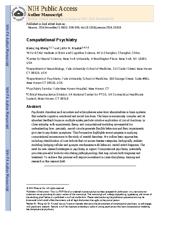A copy of this work was available on the public web and has been preserved in the Wayback Machine. The capture dates from 2020; you can also visit the original URL.
The file type is application/pdf.
Computational Psychiatry
2014
Neuron
Psychiatric disorders such as autism and schizophrenia arise from abnormalities in brain systems that underlie cognitive, emotional and social functions. The brain is enormously complex and its abundant feedback loops on multiple scales preclude intuitive explication of circuit functions. In close interplay with experiments, theory and computational modeling are essential for understanding how, precisely, neural circuits generate flexible behaviors and their impairments give rise to psychiatric
doi:10.1016/j.neuron.2014.10.018
pmid:25442941
pmcid:PMC4255477
fatcat:yscknyq4ezdfhbu2wqdlr6ch64

